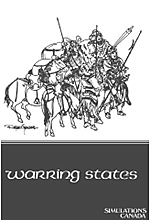 Playing Time n/a
Playing Time n/a
Period First Unification of China
Scale Grand strategic Turn One year
Map 47¼ km per hex
Units Armies
Components
1 12-page half-size rulebook
1 22” x 28” hex map of eastern China
255 backprinted die-cut counters
1 ziploc bag
Counter Manifest
13 Han units (yellow on white)
17 Wei units (black on yellow)
17 Chao units (black on cream)
26 Yen units (black on khaki)
25 Chi units (black on ochre)
30 Ch’u units (black on grey)
51 Ch’in units (white on black)
28 assassin units (4 from each of 7 states)
9 Yu Shui (advisor) units
6 randomizer chits
1 turn marker
4 blanks (3 white, 1 cream)
SimCan says:
“The period of the Contending States in ancient China lasted over two centuries. Its last decade began with 7 powerful states in constant conflict and ended with just one state remaining. Victorious, all-conquering, Ch’in brought all of China under one hand for the first time in its history, thus beginning a national entity that survives today. The game is on a grand strategic scale and may be played by 2 to 7 players with turns representing one year, hexes 47 km across and rules specifically designed to display Eastern philosophies and methods of warfare.”
The Reviewers say:
“At last! A game on pre-Mao China! The game is actually quite simple, and can be either two player or multi-player. It borrows much from old diplomacy-style games (production, assassination) and as a result there is little flavour of ancient China. At least it’s a step in the right direction.” --Richard Berg in S&T 78.
“...graphically unimpressive, even for a SimCan game, but this multiplayer had one rather noteworthy characteristic. This was a period of semi-legendary wandering advisors [Yu Shui], who sold their services to local princes. The advisors are present on the map as counters, and they move in diagonal lines and ricochet off province boundaries, like the Space War video game of the very early 1970s. This mechanic works fine in the game, but sure looks childish in play. ... In 20 years no one has come up with a better game on the subject.” --Larry Marak on Web-Grognards site.
“Warring States is a clever blend of old and new ideas in a game that requires no gymnasium or decade to play. What problems exist are very minor and do not hinder one’s enjoyment of the simulation. As relations between The United States and Communist China continue to warm, Warring States increases in interest because of the light it helps to shed on the military background of the world’s most populous nation. I believe Warring States to be one of the better games of 1979.” --Ed Coe in F&M 21.
Collectors Notes
Be sure to check for availability with Clash of Arms before venturing onto eBay. Chances are CoA will be quite a bit less expensive. Boone lists low, high and average prices of 2/4/3.00 at auction and 11/20/16.00 for sale.
Comments
Sun Tze’s Art of War plays a large part in the military philosophies and methods of this game. In summary: “All warfare is based on deception. There has never been a protracted war from which a country has benefitted. To subdue the enemy without fighting is the acme of skill. What is of supreme importance in war is to attack the enemy’s strategy. Next best is to disrupt his alliances. Next best is to attack his army. The worst policy is to attack his cities.”
Errata
- In the first sentence of 6.4 change the State’s borders to read the State’s original borders.
- The sections of land covered by blue on the map in hexes 0831, 0931, 1031, 0832 and 0932 may be entered in movement.
Steve Newberg says:
We tend to forget that Western Europe and the Middle East are not the only places to have an ancient history. Remember when the monster tomb in China with the thousands of full-size terra cotta sculpture soldiers was found? That got me interested in Ancient Chinese history. The fellow with the army to guard him in his tomb was the winner in the most significant of the wars to unify China, the topic of this title. The game is not complex, and has a number of more Eastern military concept rules systems. Itis best when played with 3 or 4 players.
Back to Simulacrum Vol. 3 No. 2 Table of Contents
Back to Simulacrum List of Issues
Back to MagWeb Master Magazine List
© Copyright 2001 by Steambubble Graphics
This article appears in MagWeb (Magazine Web) on the Internet World Wide Web. Other military history articles and gaming articles are available at http://www.magweb.com